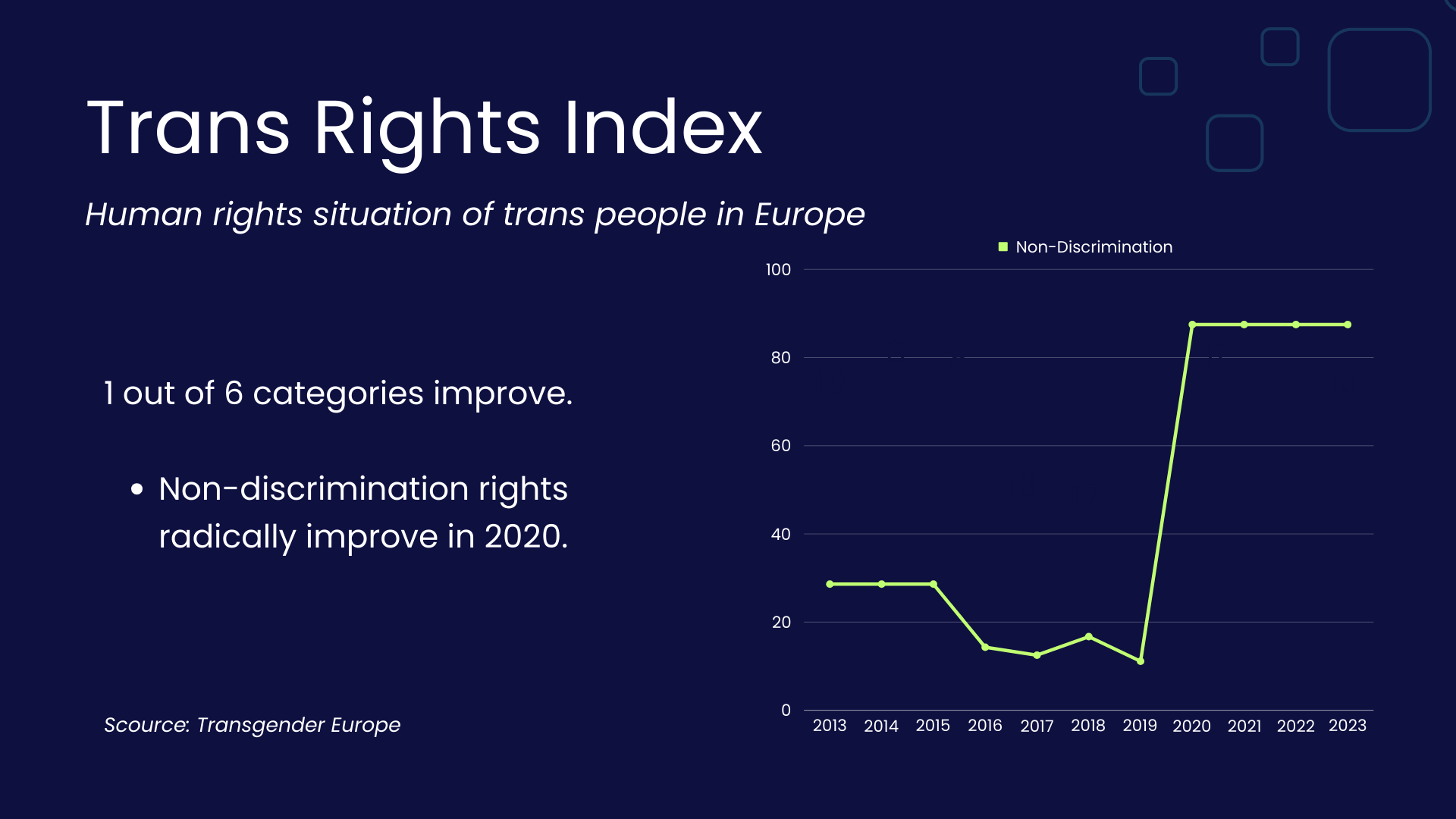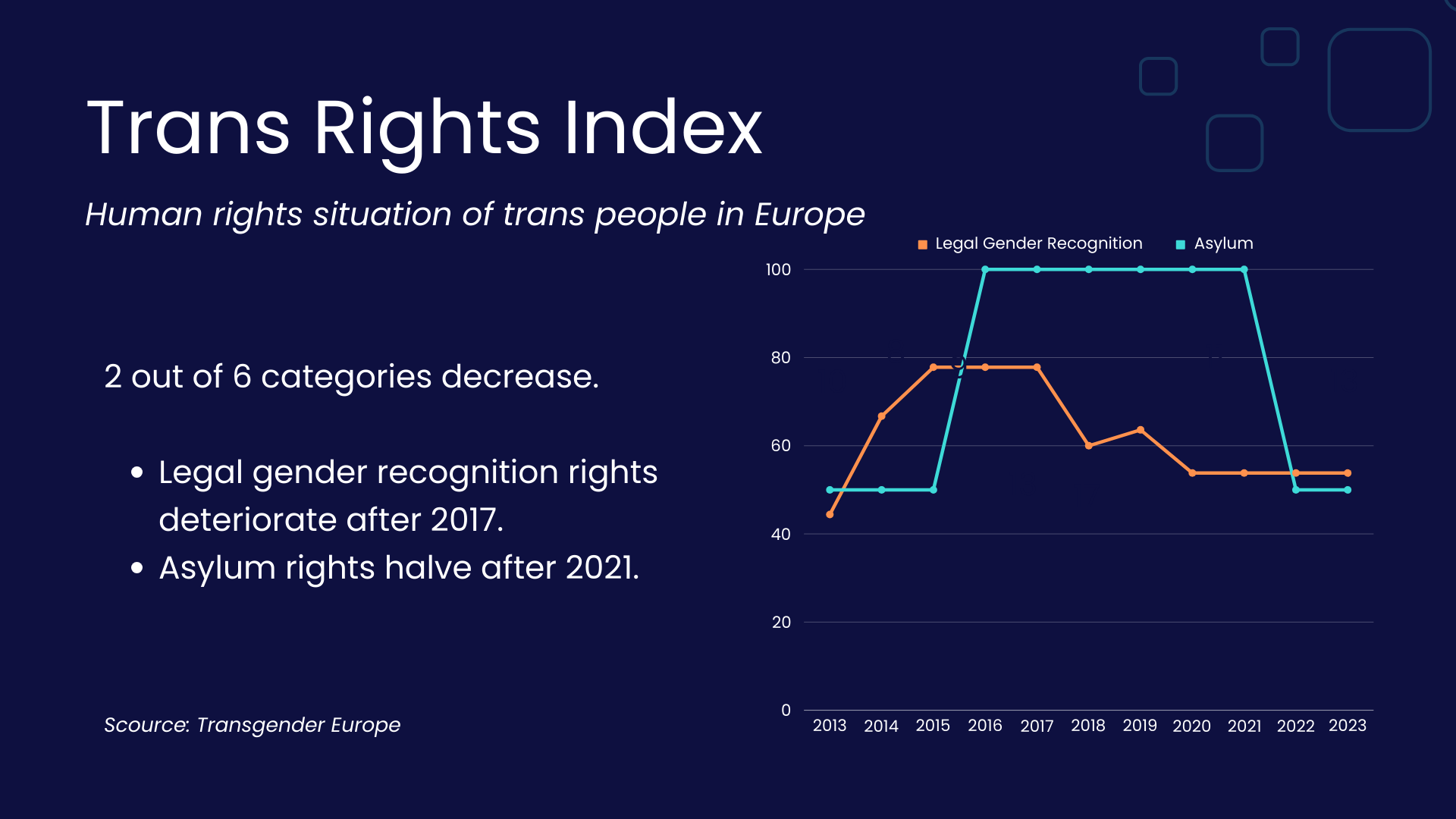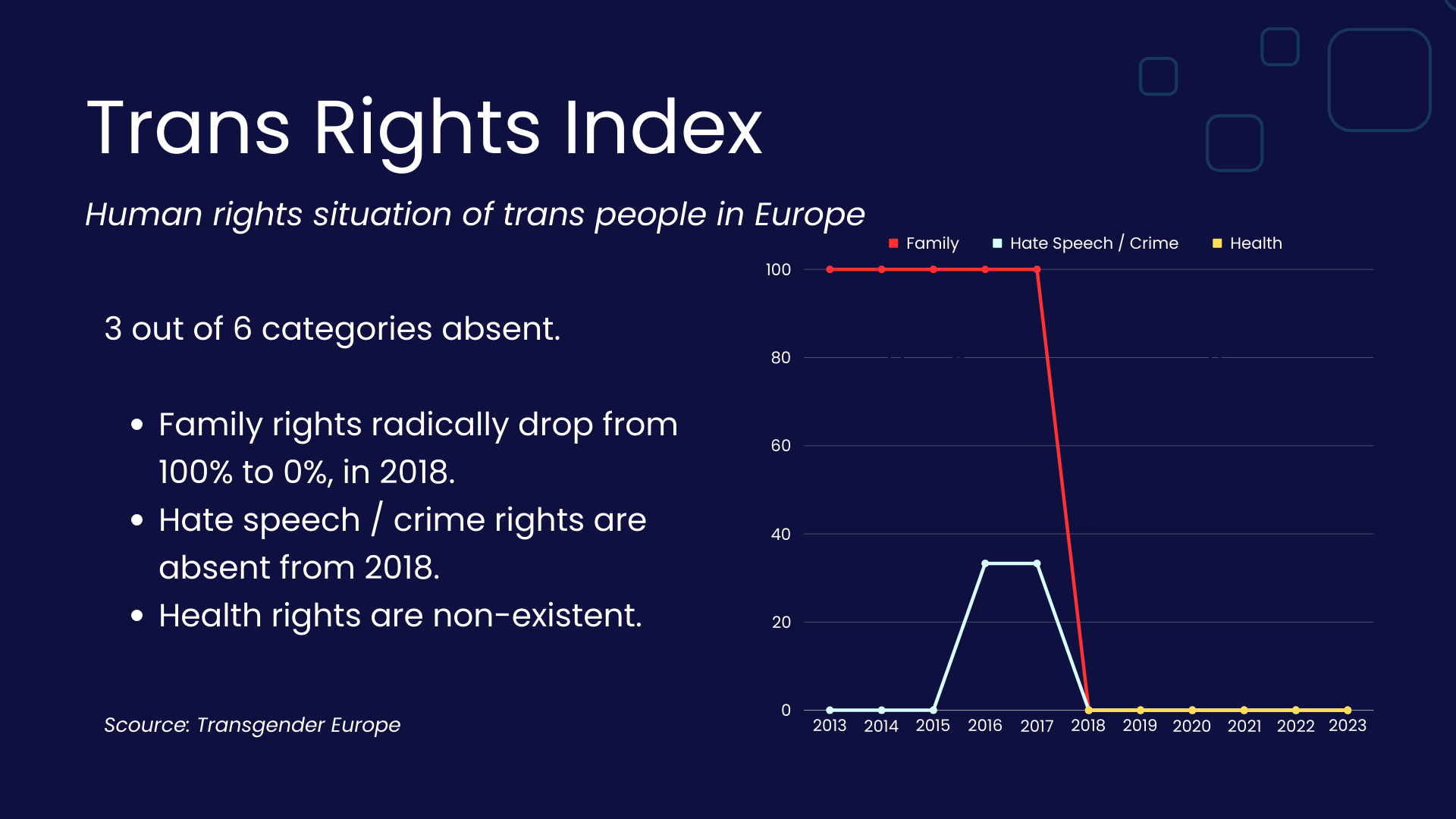Transgender people have lesser rights than cisgender people
Every year, Transgender Europe publishes the Trans Rights Map. This annual report shows how European countries are doing concerning human rights of transgender people. Our country is doing poorly: we score only 15 out of 30 points, an embarrassing 50%. The Netherlands shares position with countries like Austria, Croatia and Estonia.
Starting in 2013, Transgender Europe publishes the Trans Rights Map: Human Rights Situation of Trans People in Europe every year. In this annual review Transgender Europe inventorises the human rights situation of trans people in 49 European countries and five Central Asian countries. The results are published on the website Transrightsmap.tgeu.org.
Dutch trans human rights at 50%
The Trans Rights Map clearly shows that the Netherlands is not doing as well as many Dutch people may like to think. The Netherlands get a lousy 15 out of 30 points, which is an embarrassing 50%! In a period of 10 years we dropped from the 8th to the 13th position, in comparison to other European countries.
The Netherlands share position with Austria, Croatia and Estonia. So, when it comes to human rights it makes no difference for trans people where they live: in the Netherlands, Austria, Croatia or Estonia. That is quite astonishing… Principle 17 urges our government to pay a working visit to the top three countries: Iceland, Malta and Luxembourg. They can teach us how to implement decent human rights for trans people!
The research of the Trans Rights Map encompasses six major categories: Legal Gender Recognition rights (10 topics), Asylum rights (2 topics), Hate Speech / Crime rights (3 topics), Non-Discrimination rights (8 topics), Health rights (2 topics) and Family rights (2 topics). Principle 17 looked into these major categories separately to check how the Netherlands are doing.
Non-discrimination rights improve

After dropping from an already low 28.6% to an all time low of 11.1% in 2019, the non-discrimination rights of trans people radically improved in 2020. As of 2020 The Netherlands scores 87.5%, which is well done! Although it would be better if we would improve to 100%, so trans people could enjoy all of the non-discrimination rights.
Legal gender recognition rights & Asylum rights decrease
Unfortunately the legal gender recognition rights of trans people slowly decrease from 77.8% in 2016 to 53.8% in 2020. In the following years the Netherlands fail to improve again these rights of trans people.

When it comes to asylum rights of trans people the decrease is even worse: in 2020 we drop from 100% to 50%! After six years scoring 100%, we suddenly drop to the same level we started with in 2013. The raise after 2015 was due to asylum authorities partnering with COC Netherlands to improve LGBT asylum-seekers’ safety while in housing or detention. However, in 2022 TNN reported that trans asylum seekers are routinely failed, and LGBT Asylum Support asked protection for LGBT asylum seekers in unsafe asylum centres. Sadly, in five years we seem to have forgotten everything we learned in 2015…
Family rights, hate speech/crime rights & health rights absent
The situation of family rights of trans people is even worse than their asylum rights. Up to 2017 the Netherlands did splendid and scored 100%, because in our country it is possible for trans people to marry a person of another legal gender.
However, from 2018 onwards new criteria for family rights apply. Now we are rated on the criterium of parenthood recognition for trans people and for non-binary people. These rights don’t exist in the Netherlands, so we drop to zero family rights for trans people. In five years nothing has changed and family rights keep on being non-existent…
Concerning hate speech and crime rights of trans people the data show a similar sad story. These rights were absent until we scored 33.3% in 2016 and 2017. In these two years we did have policy tackling hatred. But unfortunately, these policies disappeared again and therefore we dropped back to an entire absence of hate speech and crime rights in 2018. This still lasts to today as well, so no hate speech and crime rights for trans people.

The absolute saddest category is that of health rights of trans people. As of the start of data collecting in 2018 the Netherlands scores 0%, meaning that trans people in the Netherlands have no health rights at all.
This lack of human rights shows in the daily life experiences of many trans people: trans people still need a psychiatric diagnosis to be able to access somatic health care, which is unheard of for any other medical treatment. In addition, the waiting time to be able to get an intake at the largest gender team is ‘at least 3 years’ for adults and ‘at least 2 years’ for adolescents*. After the intake there is another waiting list for the (forced) psychiatric assessment of ‘at least 50 weeks’ for adults and ‘at least 14 weeks’ for adolescents*.
Conclusion
In June 2023 Principle 17 already concluded that the Netherlands is doing poorly at LGBTI rights, based on an analysis of ILGA-Europe’s report Annual Review of the Human Rights Situation of LGBTI People. The Trans Rights Map of Transgender Europe shows that the Netherlands is doing even worse concerning transgender rights.
In three out of six major categories the Netherlands scores no points at all. So, Dutch transgender people do not have family rights, hate speech and crime rights nor health rights. In two major categories we score only 50%. This means that transgender people can appreciate only half of legal gender recognition rights and asylum rights. We manage to get a 50% score in general, because at one major category (non-discrimination rights) we score 87.5%. This is a very depressing conclusion about the situation of Dutch transgender rights.
The Netherlands used to have a frontrunner position when it comes to transgender rights. We were one of the first countries in the world that had medical possibilities and legal rights for transgender people. Used to have, indeed. Sadly, the Netherlands have lost their frontrunner position and have so even years ago. That’s why Principle 17, with many others, calls our government to improve the human rights of transgender people in the Netherlands!
* Source: Current waiting times at the Gender Dysphoria Knowledge and Care Center (KZcG) of the AMC, accessed 2 February 2024.




Geef een reactie